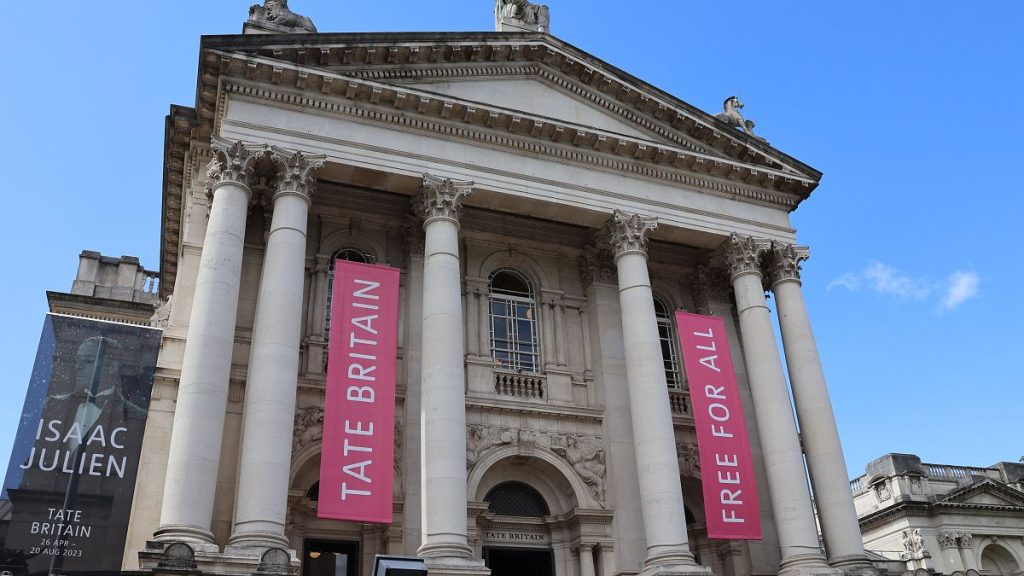An open letter initiated by a coalition of over 900 artists, including prominent figures in the art world such as current Turner Prize nominee Jasleen Kaur and past winners Charlotte Prodger, Helen Cammock, and Lawrence Abu Hamdan, addresses the Tate Museum in London. The letter calls upon Tate’s leadership to actively oppose what the signees describe as the “artwashing of genocide and apartheid.” The initiative comes as a response to Tate’s affiliations with organizations whose founders have financial ties to Israel, specifically targeting the Zabludowicz Art Trust, Zabludowicz Art Projects, and Outset Contemporary Art Fund. The artists and art workers argue that these connections implicate Tate in complicity with ongoing violence against Palestinians, particularly in Gaza.
The accusations against the founders of the targeted organizations, Anita and Poju Zabludowicz, and Candida Gertler, appeal to international legal findings from entities like the International Court of Justice and the United Nations. These bodies have characterized Israel’s military actions as consistent with terms such as “plausible genocide” and “apartheid,” reinforcing the letter’s assertion that Tate has a moral obligation to sever its ties with these groups. Amnesty International has echoed this sentiment, denouncing Israel’s policies as crimes of apartheid. The letter emphasizes that Tate’s involvement with these organizations undermines its purported commitment to equality and social justice in the arts, reflecting a broader ethical responsibility within the art community.
Central to the artists’ arguments is the concept of “artwashing,” which they define as the practice of leveraging cultural partnerships to obscure contentious political affiliations. The letter posits that Tate’s ongoing collaborations with organizations linked to the Israeli state effectively diminish the museum’s social impact and commitment to equality. By maintaining these ties, the letter argues, Tate diminishes its ethical standing and fails to align its practices with its avowed values. The signees urge Tate to reconsider its partnerships to uphold a genuine commitment to cultural and social responsibility.
Importantly, the letter draws parallels with Tate’s prior decisions to divest from Russian donors after the invasion of Ukraine in 2022. This historic context provides a framework within which the artists and art workers advocate for a similarly decisive act against what they view as complicit behavior regarding Israel. The appeal for divestment highlights a tactic that Tate has utilized in response to geopolitical crises, urging the museum’s leaders to apply the same ethical scrutiny to their relationships with Israeli-affiliated organizations and funders. The artists’ call serves to reinforce the urgency of addressing moral dilemmas faced by cultural institutions today.
Recent developments, including successful student activism at Goldsmiths, University of London, which pressured the Goldsmiths Centre for Contemporary Art to sever ties with Candida and Zak Gertler over their political associations, evidence a growing movement within the arts to hold institutions accountable. The signed letter reflects a broader cultural mobilization, following over 1,000 authors and artists’ participation in what has been termed history’s largest cultural boycott against Israel’s publishing sector. The collective response highlights a significant commitment among creatives to advocate for social justice and address perceived complicity in state-sponsored violence.
As the Turner Prize ceremony approaches, the timing of this open letter emphasizes the heightened sense of urgency surrounding these issues. The artists and activists involved are determined to ignite dialogue within the art community about its social responsibility and ethics in light of the ongoing humanitarian crisis in Palestine. Their collective stance signals a potential shift in how cultural institutions may engage with political and moral complexities, advocating for transparency, accountability, and a stronger commitment to human rights in the arts. Their call to action encourages Tate, and similar institutions, to reflect critically on their affiliations and consider the moral implications of their partnerships in the face of ongoing global injustices.














